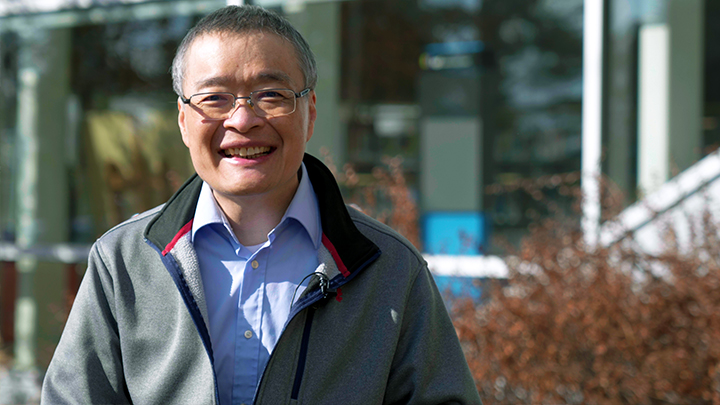
April 18, 2023

Tony Wong is grateful for his organ donor, after undergoing a liver transplant in 2022. Alberta’s organ donation and transplantation teams facilitated a record number of organ transplants last year. In 2022, 491 organ transplants were performed in Alberta, exceeding the previous record of 462 set in 2017.Photo by Evan Isbister.
Story by Marni Kuhlmann | Photo by Evan Isbister
Organ and tissue donation is an extraordinary gift that saves lives. In 2022, hundreds of lives were saved thanks to generous donors and families.
One of those lives was that of Tony Wong. The Edmonton resident underwent a liver transplant in August 2022 after eight months on the waiting list. Wong had a history of liver cancer and transplant was his only option.
“I had multiple recurrences of liver cancer over an eight-year period and, despite my best efforts to deal with the tumours, I’d run out of options,” says Wong. “Thanks to the gift of donation, my life was saved and I have been able to return to spending more time with the people I love and doing the things I enjoy.”
Alberta’s organ donation and transplantation teams facilitated a record number of organ transplants last year. In 2022, 491 organ transplants were performed in Alberta, exceeding the previous record of 462 set in 2017. This overall record includes 107 liver transplants and 254 kidney transplants, both records. Alberta’s deceased donation rate of 21 donors per million population in 2022 was the highest ever in the province, and among the highest in Canada.
“Organ and tissue donation isn’t always top of mind for patients and families, or for healthcare teams. Everyone’s first priority is to save the lives of critically ill patients. However, when this is not possible, the opportunity to donate honours the wishes of some of our patients and is also important to their families,” says Dr. Andreas Kramer, critical care physician and organ donation specialist with AHS.
“We have worked hard to ensure the option of donation is a routine part of end-of-life care. By raising awareness and having those conversations about organ and tissue donation, we can empower families to consider the option.”
Dr. Kramer adds the engagement and support of frontline critical care and emergency professionals have been key factors in improving donation rates, as well as the establishment of the Specialist in End-of-Life Care, Neuroprognostication and Donation (SEND) program in 2021.
The SEND team comprises 22 intensive care physicians across Alberta, who dedicate part of their time to education and consultation with healthcare teams, to identify and care for potential organ donors.
Mandatory referral legislation as part of Bill 205, the Human Tissue and Organ Donation (Mandatory Referral) Amendment Act, was implemented April 1. It further supports the provincial donation and transplantation system by creating a more structured pathway for the organ-donation process. This ensures specialists have adequate time to identify and assess potential organ donors and discuss the option with families.
A single donor can save up to eight lives and improve the lives of 75 others, who could receive tissue from a donor. Living donation has become more common in recent years, and specialists hope the increased focus on education will mean more families consider all options of living and deceased donation.
More than 844,000 Albertans have legally registered to affirm their wishes to donate their organs and/or tissues on the province’s online organ and tissue donation registry since its launch in 2014.
Albertans can also document their desire to donate organs and/or tissues at their local registry agent when they renew their driver’s license or other identification.